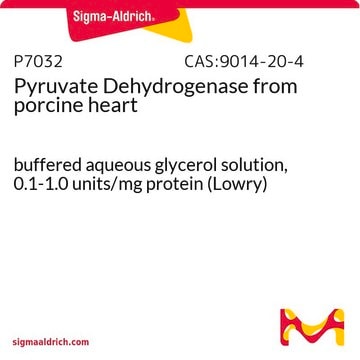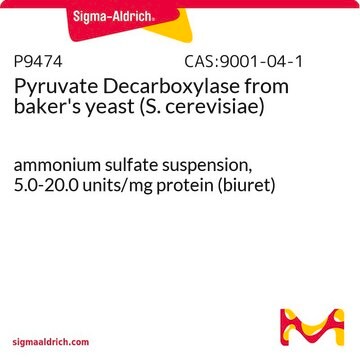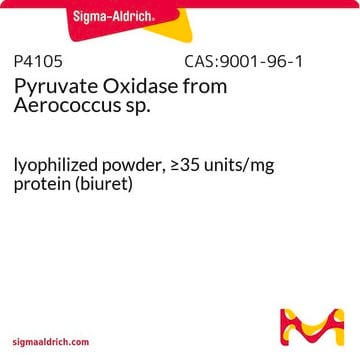P7173
Pyruvate Carboxylase from bovine liver
buffered aqueous glycerol solution, 5-25 units/mg protein (BCA)
Synonym(s):
Pyruvate:CO2 ligase (ADP-forming)
Sign Into View Organizational & Contract Pricing
All Photos(1)
About This Item
CAS Number:
MDL number:
UNSPSC Code:
12352204
NACRES:
NA.26
Recommended Products
form
buffered aqueous glycerol solution
Quality Level
specific activity
5-25 units/mg protein (BCA)
concentration
≥0.5 mg/mL
foreign activity
lactic dehydrogenase ≤0.5%
storage temp.
−20°C
Looking for similar products? Visit Product Comparison Guide
Application
Pyruvate is critical for gluconeogenesis, lipogenesis, glyceroneogenesis, neurotransmitter biosynthesis and glucose-induced insulin, and is used to study these processes.
The enzyme from Sigma has been used as a positive control during the assay of pyruvate carboxylase activity in cell-free extracts of Corynebacterium glutamicum.
Biochem/physiol Actions
Pyruvate carboxylase catalyzes the carboxylation of pyruvate to oxaloacetate. Pyruvate carboxylase is a mitochondrial protein that has a biotin prosthetic group that requiries magnesium or manganese and acetyl CoA.
Unit Definition
One unit will convert 1.0 μmole of pyruvate and CO2 to oxalacetate per min at pH 7.8 at 30 °C.
Physical form
Solution in 50% glycerol containing 0.05 M Tris-HCl, pH 7.4, 2 mM magnesium acetate and 1 mM EDTA.
Preparation Note
Affinity purified
Storage Class Code
10 - Combustible liquids
WGK
WGK 1
Flash Point(F)
Not applicable
Flash Point(C)
Not applicable
Certificates of Analysis (COA)
Search for Certificates of Analysis (COA) by entering the products Lot/Batch Number. Lot and Batch Numbers can be found on a product’s label following the words ‘Lot’ or ‘Batch’.
Already Own This Product?
Find documentation for the products that you have recently purchased in the Document Library.
Philip Lee et al.
Hepatology (Baltimore, Md.), 57(2), 515-524 (2012-08-23)
The pathogenesis of type 2 diabetes is characterized by impaired insulin action and increased hepatic glucose production (HGP). Despite the importance of hepatic metabolic aberrations in diabetes development, there is currently no molecular probe that allows measurement of hepatic gluconeogenic
Eunsook S Jin et al.
Metabolism: clinical and experimental, 62(1), 152-162 (2012-09-18)
A three-day high-fat diet induces hepatic steatosis and hepatic insulin resistance in rats without altering fasting plasma glucose concentration or the rate of glucose production. However, as the nutrient profile available to the liver is substantially altered by a high-fat
H M White et al.
Journal of dairy science, 95(3), 1249-1256 (2012-03-01)
Expression of mRNA for pyruvate carboxylase (PC) is elevated at calving and during other physiological states when plasma NEFA concentrations are increased. The objective of this study was to determine the direct effects of fatty acids on expression of PC
Abdussalam Adina-Zada et al.
Biochemistry, 51(41), 8208-8217 (2012-09-19)
Mutation of Arg427 and Arg472 in Rhizobium etli pyruvate carboxylase to serine or lysine greatly increased the activation constant (K(a)) of acetyl CoA, with the increase being greater for the Arg472 mutants. These results indicate that while both these residues
Scott B Crown et al.
BMC systems biology, 6, 43-43 (2012-05-18)
¹³C-Metabolic flux analysis (¹³C-MFA) is a standard technique to probe cellular metabolism and elucidate in vivo metabolic fluxes. 13C-Tracer selection is an important step in conducting ¹³C-MFA, however, current methods are restricted to trial-and-error approaches, which commonly focus on an
Our team of scientists has experience in all areas of research including Life Science, Material Science, Chemical Synthesis, Chromatography, Analytical and many others.
Contact Technical Service








